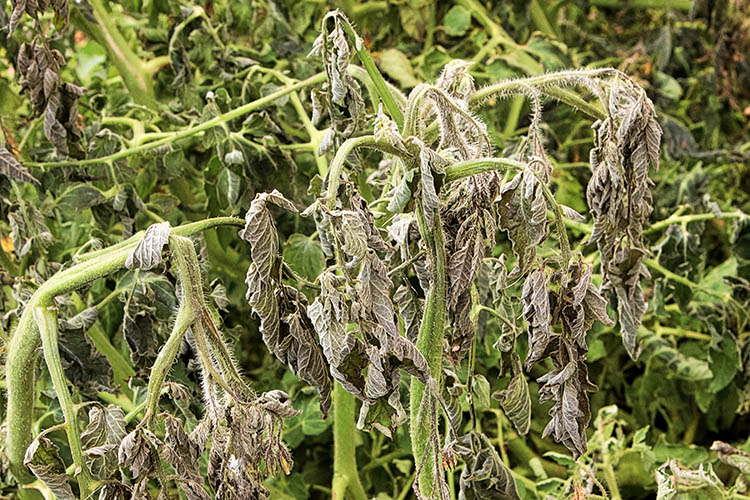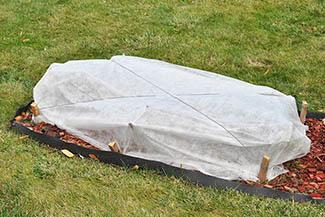Gardeners beware; late frosts in the forecast for much of the state
Gardeners beware; late frosts in the forecast for much of the state

LEXINGTON, Ky., — Unseasonably cold temperatures are putting the kibosh on the spring dreams of many Kentucky gardeners, who are itching to plant young annuals or vegetables or may already have done so.
Though it is late in the season for frosts and freezes, especially in Western Kentucky, there is the potential in the short-range forecast for multiple nights with temperatures in the 30s, and even into the 20s on Friday night, across much of the state.
“Many record lows will be in jeopardy of being broken,” said Matt Dixon, senior meteorologist with University of Kentucky College of Agriculture, Food and Environment. “Temperatures have started to trend a little cooler for Friday night and Saturday morning across the eastern half of the state. Several locations could very well drop into the upper 20s, maybe some middle 20s in the valley locations.”
These well-below-normal lows carry the possibility of frost and freeze damage. Normal low temperatures through the middle of May average in the low- to mid-50s.
The previous warm weather lured some folks into transplanting summer annuals early. Common annual plants susceptible to frosts and freezing temperatures are impatiens, begonias, marigolds, zinnias, geraniums and sweet potato vine.
Rick Durham, UK extension horticulture professor, recommends that homeowners cover delicate new plantings or small blooming shrubs to protect them from a hard frost.
Tomatoes, peppers, squash and beans are very susceptible to frost and need to be covered. Plants such as cauliflower or lettuce are hardier and should survive unless temperatures drop into the 20s.
Perennial plants will be more resistant but may still experience some damage if temperatures drop below freezing. They will usually rebound by sending out additional growth, if the new growth is damaged.
On the other hand, there are many flowering plants and vegetables that are cold hardy. Asparagus, collards, kale, spinach, peas, potatoes, and rhubarb are some of the vegetables that are very hardy when temperatures dip, while beets, broccoli, cabbage, carrots, and radishes are frost tolerant. Cornflower, pansies, primrose, dianthus and violets are very hardy, and black-eyed Susan, coreopsis, snapdragons and sweet peas tolerate frost. These plants may look wilted after a hard frost or freeze but will usually recover with warming temperatures.
 Commercial frost cloths are available that can protect some plants down to temperatures as low as 20 degrees F when used properly. Garden blankets, such as Reemay, are good row covers that can protect large groupings of tender spring flowers and vegetables.
Commercial frost cloths are available that can protect some plants down to temperatures as low as 20 degrees F when used properly. Garden blankets, such as Reemay, are good row covers that can protect large groupings of tender spring flowers and vegetables.
However, covers don’t have to be elaborate or expensive to work. A row of stakes with newspaper, cardboard, or sheets and towels tented over them will do just fine. If gardeners don’t have stakes, they can lay the covers directly over plants and anchor them on the ground with rocks. This will prevent heat loss, though the plant may suffer minor damage where the covers touch them directly. Other materials that can be used as covers are blankets, drop cloths, an inverted flowerpot or bucket and milk jugs with the bottom cut out. Clear plastic materials are less useful, since radiant energy often passes through them.
“If you’re going to cover your plants before a hard frost, do so before dusk. Soil contains heat that is released at night as radiant energy. Draping a cloth or other fabric that can block radiant energy will hold this heat near the plants. If you wait until darkness falls, most of the stored heat in your garden will have dissipated,” Durham said. “No matter what type of cover you use, make sure that it extends down to the soil on each side. Do not leave any openings for warmth to escape.”
If covering a tree or shrub, do not tie the covering to the trunk. It must drape to the ground to keep in the heat radiating from the soil. For this reason, it is very difficult to protect large trees and shrubs.
In the morning, remove the covers soon after the frost has thawed. Failing to do so causes a buildup of heat beneath the cover and could cause additional damage.
Durham said by now most trees and shrubs have leafed out and this new growth could suffer damage.
“Colder temperatures may kill leaves, flowers and small branches, but plants will usually be able to regrow,” he said.
Some trees and shrubs already suffered a hard freeze just as they were breaking dormancy, when temperatures dipped to 25 degrees in mid-April. Those trees are just now starting to put out a second growth of leaves to replace the ones lost. Cover the shrub or small tree completely, if it is feasible. However, if the tree is too large to cover adequately, Durham said there is not much that can be done. Repeated damage to woody plants may result in decline or death, but those in good health may recover.
Some pruning of dead branches may be necessary after new growth resumes.
Fruit trees and shrubs may be very susceptible to the low temperatures this week. Apple, peach, plum and pear have all flowered and have small fruit on the trees. This fruit will be damaged if temperatures drop into the 20s. Blueberries may also be blooming and should be protected. Blackberries and raspberries bloom a little later and blooms should escape damage unless temperatures fall below the upper 20s. Fruit and blooms on strawberries will be susceptible, but they are easily covered and protected.
For more information about protecting plantings from frosts and freezes, check with the local office of the University of Kentucky Cooperative Extension Service.
Horticulture Weather

